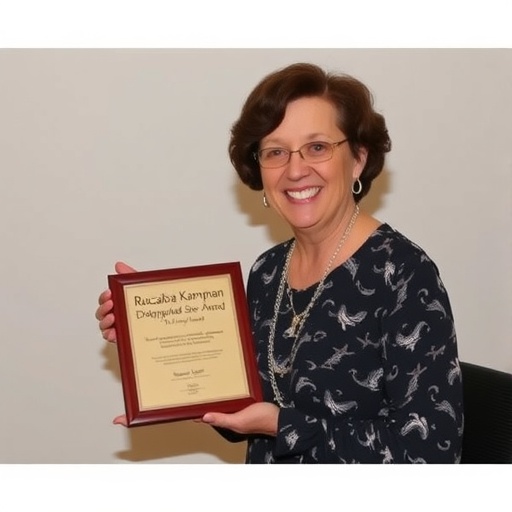BETHESDA, MD – In a significant and well-deserved recognition, the Biophysical Society has announced that Nuria Assa-Munt, formerly of the Center for Scientific Review at the National Institutes of Health (NIH), has been awarded the prestigious Rosalba Kampman Distinguished Service Award for 2026. This accolade will be formally presented to Assa-Munt at the Society’s upcoming 70th Annual Meeting, scheduled to take place in San Francisco, California, from February 21 to 25, 2026. This announcement marks not only a celebration of Assa-Munt’s outstanding career but also shines a spotlight on the critical role of scientific review in advancing the field of biophysics.
Over a career spanning two decades, Nuria Assa-Munt has exemplified extraordinary dedication to the advancement of biophysics through her leadership and unwavering commitment to excellence in NIH’s peer review process. Her retired status does not diminish the enduring legacy she leaves, one marked by the enhancement of rigorous standards that ensured the allocation of research funding to the most scientifically promising proposals. Her meticulous oversight contributed directly to the expansion and deepening of biophysical research, fostering advancements at the intersection of biology, physics, and chemistry.
The peer review process that Assa-Munt spearheaded is a cornerstone of federal research funding, particularly within the NIH. This process demands not only scientific rigor but an ability to evaluate interdisciplinary work that often pushes the boundaries of traditional scientific disciplines. Biophysics, inherently complex, requires evaluators to balance knowledge across molecular dynamics, structural biology, computational modeling, and systems biology—a challenge that Assa-Munt met with finesse and precision. Her efforts ensured high-impact research projects received necessary support, thereby catalyzing innovations that resonate through both academia and industry.
Beyond the procedural excellence, Assa-Munt’s true influence lies in her mentorship and community building within the scientific review panels. She forged strong collaborations and cultivated a supportive environment among reviewers, knowing that the integrity and effectiveness of the review process depend heavily on collective expertise and shared commitment. Her nurturing approach enabled researchers at different career stages to thrive, advancing not only individual careers but strengthening the overall scientific community’s fabric.
Lynmarie Thompson, President of the Biophysical Society and Professor at the University of Massachusetts Amherst, emphasized the transformative impact of Assa-Munt’s work. Thompson highlighted that Nuria’s leadership extended beyond administrative oversight to embody a mission-driven style of service aimed at fortifying the biophysics discipline. “Nuria built communities and nurtured those she recruited throughout their careers,” Thompson remarked, underscoring the profound and personal nature of Assa-Munt’s influence on science policy and workforce development.
The Rosalba Kampman Distinguished Service Award, which Nuria Assa-Munt will receive, carries a legacy of honoring service that transcends direct research achievements. Named after the former Executive Officer of the Biophysical Society in 2019, this award acknowledges those whose dedicated service has profoundly shaped the scientific ecosystem. Assa-Munt’s receipt of this award reaffirms the importance of leadership roles that facilitate the infrastructure of scientific progress, a dimension often overlooked in traditional measures of scientific impact.
Assa-Munt’s contributions must also be viewed in the context of a rapidly evolving biophysical landscape. The field continuously integrates novel technologies—from cryo-electron microscopy to single-molecule spectroscopy and advanced computational simulations—demanding a deep understanding of both experimental and theoretical methodologies. Her stewardship in peer review ensured that funding strategies kept pace with these advancements, supporting projects that explore fundamental biomolecular processes with unprecedented resolution and accuracy.
Moreover, the significance of funding decisions in science cannot be overstated. At NIH, peer review outcomes directly influence resource allocation, driving the trajectory of research programs nationally and globally. The stewardship exemplified by Assa-Munt fortified a rigorous, transparent system wherein the potential for scientific breakthroughs could be maximized. This system underpins many of the transformative discoveries in molecular motors, membrane dynamics, protein folding, and biomolecular interactions that define modern biophysics.
In addition to her administrative and review duties, Nuria Assa-Munt played a pivotal role in promoting diversity and inclusivity within the scientific review panels and the broader biophysics community. By advocating for the involvement of early-career scientists and underrepresented groups in the peer review process, she fostered a more equitable environment where varied perspectives enrich decision-making. This commitment aligns with broader societal goals to democratize access to funding and opportunity in science.
As the Biophysical Society prepares to mark its 70th Annual Meeting in 2026, Assa-Munt’s recognition comes at a symbolic juncture wherein the community reflects on both its history and future directions. The Society itself, founded in 1958, has grown into a vibrant assembly of over 6,500 members worldwide, dedicated to bridging physical sciences and life sciences at multiple scales. Assa-Munt’s award reflects the essential values the Society upholds: excellence, collaboration, and transformative science.
The upcoming meeting in San Francisco not only honors Nuria Assa-Munt but also offers a platform to discuss the evolution of peer review and funding models in biophysics. As the field faces new challenges, including data reproducibility, ethical considerations in research, and the integration of artificial intelligence, the foundational work of leaders like Assa-Munt provides a guiding framework for responsible stewardship of scientific resources.
Finally, Nuria Assa-Munt’s career serves as a testament to the profound impact that dedicated service roles have on science’s advancement. While individual discoveries capture headlines, it is the sustained, thoughtful orchestration of funding, review, and training that ultimately cultivates a fertile ground for discovery. Through her work, Assa-Munt has shaped not only what science is pursued but also who pursues it and how the community thrives collectively.
This distinguished service award is more than a personal accolade; it is an acknowledgment of the crucial infrastructure behind scientific innovation. Nuria Assa-Munt’s enduring legacy will resonate through the programs she influenced, the scientists she mentored, and the discoveries her efforts helped bring to fruition. Her example inspires ongoing commitment to excellence and fairness in one of science’s most vital yet underappreciated functions—peer review and service leadership.
Subject of Research:
Article Title:
News Publication Date:
Web References:
References:
Image Credits:
Keywords: Biophysics, NIH Peer Review, Scientific Funding, Rosalba Kampman Distinguished Service Award, Biophysical Society, Scientific Leadership, Research Mentorship




